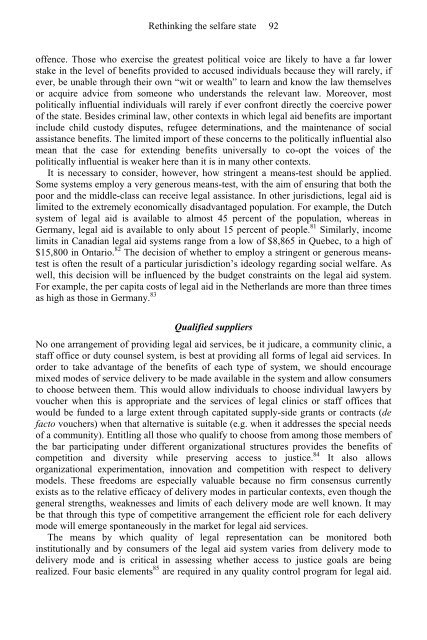Rethinking the Welfare State: The prospects for ... - e-Library
Rethinking the Welfare State: The prospects for ... - e-Library
Rethinking the Welfare State: The prospects for ... - e-Library
Create successful ePaper yourself
Turn your PDF publications into a flip-book with our unique Google optimized e-Paper software.
<strong>Rethinking</strong> <strong>the</strong> selfare state 92<br />
offence. Those who exercise <strong>the</strong> greatest political voice are likely to have a far lower<br />
stake in <strong>the</strong> level of benefits provided to accused individuals because <strong>the</strong>y will rarely, if<br />
ever, be unable through <strong>the</strong>ir own “wit or wealth” to learn and know <strong>the</strong> law <strong>the</strong>mselves<br />
or acquire advice from someone who understands <strong>the</strong> relevant law. Moreover, most<br />
politically influential individuals will rarely if ever confront directly <strong>the</strong> coercive power<br />
of <strong>the</strong> state. Besides criminal law, o<strong>the</strong>r contexts in which legal aid benefits are important<br />
include child custody disputes, refugee determinations, and <strong>the</strong> maintenance of social<br />
assistance benefits. <strong>The</strong> limited import of <strong>the</strong>se concerns to <strong>the</strong> politically influential also<br />
mean that <strong>the</strong> case <strong>for</strong> extending benefits universally to co-opt <strong>the</strong> voices of <strong>the</strong><br />
politically influential is weaker here than it is in many o<strong>the</strong>r contexts.<br />
It is necessary to consider, however, how stringent a means-test should be applied.<br />
Some systems employ a very generous means-test, with <strong>the</strong> aim of ensuring that both <strong>the</strong><br />
poor and <strong>the</strong> middle-class can receive legal assistance. In o<strong>the</strong>r jurisdictions, legal aid is<br />
limited to <strong>the</strong> extremely economically disadvantaged population. For example, <strong>the</strong> Dutch<br />
system of legal aid is available to almost 45 percent of <strong>the</strong> population, whereas in<br />
Germany, legal aid is available to only about 15 percent of people. 81 Similarly, income<br />
limits in Canadian legal aid systems range from a low of $8,865 in Quebec, to a high of<br />
$15,800 in Ontario. 82 <strong>The</strong> decision of whe<strong>the</strong>r to employ a stringent or generous meanstest<br />
is often <strong>the</strong> result of a particular jurisdiction’s ideology regarding social welfare. As<br />
well, this decision will be influenced by <strong>the</strong> budget constraints on <strong>the</strong> legal aid system.<br />
For example, <strong>the</strong> per capita costs of legal aid in <strong>the</strong> Ne<strong>the</strong>rlands are more than three times<br />
as high as those in Germany. 83<br />
Qualified suppliers<br />
No one arrangement of providing legal aid services, be it judicare, a community clinic, a<br />
staff office or duty counsel system, is best at providing all <strong>for</strong>ms of legal aid services. In<br />
order to take advantage of <strong>the</strong> benefits of each type of system, we should encourage<br />
mixed modes of service delivery to be made available in <strong>the</strong> system and allow consumers<br />
to choose between <strong>the</strong>m. This would allow individuals to choose individual lawyers by<br />
voucher when this is appropriate and <strong>the</strong> services of legal clinics or staff offices that<br />
would be funded to a large extent through capitated supply-side grants or contracts (de<br />
facto vouchers) when that alternative is suitable (e.g. when it addresses <strong>the</strong> special needs<br />
of a community). Entitling all those who qualify to choose from among those members of<br />
<strong>the</strong> bar participating under different organizational structures provides <strong>the</strong> benefits of<br />
competition and diversity while preserving access to justice. 84 It also allows<br />
organizational experimentation, innovation and competition with respect to delivery<br />
models. <strong>The</strong>se freedoms are especially valuable because no firm consensus currently<br />
exists as to <strong>the</strong> relative efficacy of delivery modes in particular contexts, even though <strong>the</strong><br />
general strengths, weaknesses and limits of each delivery mode are well known. It may<br />
be that through this type of competitive arrangement <strong>the</strong> efficient role <strong>for</strong> each delivery<br />
mode will emerge spontaneously in <strong>the</strong> market <strong>for</strong> legal aid services.<br />
<strong>The</strong> means by which quality of legal representation can be monitored both<br />
institutionally and by consumers of <strong>the</strong> legal aid system varies from delivery mode to<br />
delivery mode and is critical in assessing whe<strong>the</strong>r access to justice goals are being<br />
realized. Four basic elements 85 are required in any quality control program <strong>for</strong> legal aid.


